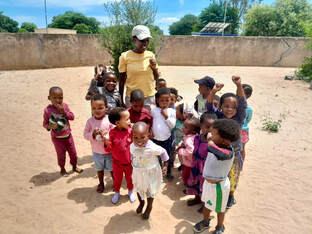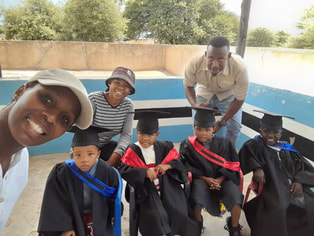We worked together with early-childhood development specialists “Learn to Play” to set up the community playgroup in Kacgae in 2020 following a request for help from the community. The villagers were concerned by the dropout rates of children at the local primary school and regional high school. Early Childhood Development is key to establishing a strong foundation for future development at the individual level and has been highlighted in the past by UNICEF as being an area requiring improvement in Botswana. Pre-school education helps bridge the learning gap between home life and school life and helps prepare students for life in primary school. This is important for all children, but especially important in rural villages of Botswana, where children grow up speaking indigenous San dialects rather than the English and Setswana that is used in the primary schools. The more these children can be exposed to English and Setswana before they attend primary school, the better equipped they are to transition to the classroom setting and the fewer dropouts will occur.
We are thrilled that so far the children who have graduated the playgroup previously have been progressing very well at the primary school. Head Mama Veriphi reports:
“The kids that have graduated here – at the school the teacher tells us that they are doing very good – better than those from the (village run) preschool. They know how to hold their pencils, they know how to differentiate colours, to speak. When the teachers ask them a question, they are open to answer – they are not shy. From that – those teachers compliments – we are proud of that.”
Hot off the press from the Ministry of Education and Skills Development is that after many years of consultations and debate, the Government schools are introducing some indigenous languages into rural primary schools to help reach more students in a meaningful manner. As part of this roll out, we are very pleased to see that primary schools within our focal area, including Kacgae, Bere, East Hanahai and West Hanahai will partake in the “Phase 1 implementation of mother tongue languages”. For these schools the mother-tongue language will be the San Bushmen dialect of Naro. This move will hopefully help reduce primary school dropout rates and improve education levels in these rural settlements.




 RSS Feed
RSS Feed
